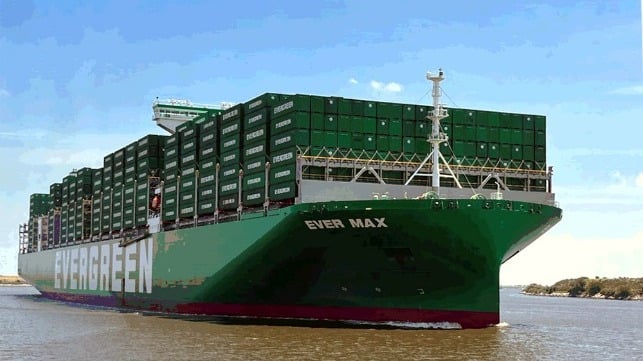AI-Based Autonomous Navigation Guides Boxship During Pacific Crossing

The efforts to develop the potential of autonomous navigation or using artificial intelligence (AI) to improve the navigation of vessels took another step forward with the latest long-distance trial. Samsung Heavy Industries reports working with Evergreen, it completed a 10,000 km (5,400 nautical mile) trans-Pacific voyage, demonstrating advancements in its Autonomous Navigation Technology.
Development of the Samsung Autonomous Ship began in 2019 as an autonomous navigation system. Previous tests included a 500-nautical-mile voyage in Korean waters using a university training vessel. For this new test, the system was deployed on one of Evergreen’s largest containerships, the 160,000 dwt Ever Max, which has a capacity to transport approximately 15,500 TEU. The vessel entered service in 2023 as part of the company's M Class.
The demonstration was conducted between August 25 and September 6, sailing from Oakland, California, to Kaohsiung, Taiwan. Samsung reports the system performed 104 optimal guidance operations and 224 automatic ship control operations during the voyage. It analyzed weather conditions every three hours and adjusted the vessel to weather and route situations without crew intervention.
The system incorporates a range of technologies to create a situation awareness. It combines signals from the radar, GPS, and images from cameras to analyze the situation. It has automatic control of the engines and rudders for collision avoidance.
“SAS has evolved from an autonomous navigation assistance system for collision avoidance to a level where it maintains economical speed on its own and meets arrival times,” said Lee Dong-yeon, vice president and head of the Shipbuilding and Offshore Research Institute at Samsung Heavy Industries.
The trip on the Ever Max resulted in a fuel saving for the vessel over contention operations. Also, Samsung highlights that the ship achieved an on-time arrival.

that matters most
Get the latest maritime news delivered to your inbox daily.
Samsung emphasizes the critical need for vessels to maintain their schedules and the impact that weather and variables can have on operations. By constantly analyzing the weather conditions and navigational circumstances, the system can optimize the vessel’s performance. On-time arrival, they note, reduces supply chain problems and costly delays for the shipping company.
South Korean shipbuilders are investing in autonomous technology for shipping as one of their advantages in the market. Samsung Heavy Industries has been testing and demonstrating its systems, as have its competitors. HD Hyundai Heavy Industries demonstrated a version of its autonomous navigation system developed by its subsidiary Avikus in 2022 on another long-distance voyage aboard an LNG carrier. Avikus is commercializing its offering with a version for pleasure craft and looks to also expand to large commercial vessels.
